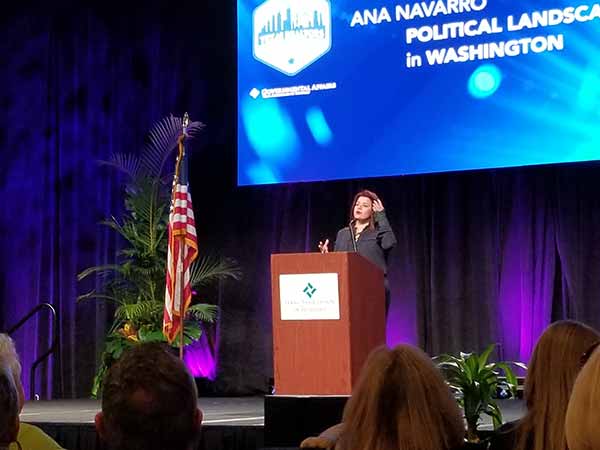 Takeaways
Takeaways
- The National Flood Insurance program is deeply flawed and needs reform
- Industry consolidation is going to speed up in the near future
- Conventions are great!
September 08-11, I was in my native city of Dallas (not far from the hospital I was born), attending the Texas Association of Realtors Conference in 2017. As in past year, I like to do a summary of some of my big takeaways and thoughts on the conference, including a controversial one.

Realtors are Wrong on Flood Insurance
Background
The topic of flood insurance was already scheduled for the Conference, but became all the more relevant with the flooding in Houston from Hurricane Harvey. The National Flood Insurance Program became a hot topic on the national stage. TREPAC, the Texas Real Estate Political Action Committee, lobbied hard to extend the program, and continue to lobby to extend the program.
Congressman Al Green from the Houston area spoke during the Governmental Affairs forum about flood insurance, generally speaking on the need to extend the program longer than the three months that it had been extended by at the time. He asked for questions from an audience of several hundred, and no one asked him anything. I wish I had, but wasn’t sure I knew what I was talking about.
If anyone at the Conference had any misgivings about extending the flood insurance program, I didn’t hear about it. And Congress apparently agrees, because they extended the program in a lopsided and mostly uncontroversial vote.
Why TREPAC is Wrong
The National Flood Insurance Program is a subsidy, plain and simple. Nothing wrong with a subsidy per se, except the simple economic rule: “You get more of whatever you subsidize”. Sometimes subsidies turn into perversions of what we intended, like when we think we are subsidizing education, but are actually subsidizing student loans (meaning the loans get bigger, not the quantity or quality of education).
That is exactly what happens with the national flood insurance program. We are in effect subsidizing flood prone homes. Therefore, we get more flood prone homes. It becomes cheaper than the market reflected risk, encouraging builders and homeowners to take those risks. Far more thoughtful and thorough articles on this issue can be found here, here, here, here and here. The result is increased economic toll, non-flood prone States and homeowners subsidizing flood prone States and homeowners, and potentially increased human toll during these disasters.
Why is TREPAC and TAR in favor of extending the national flood insurance program, then? Some aspects make sense – like grandfathering homes that are rezoned into flood zones during FEMA’s updates every 10 years or so. But ultimately, a market based price for flood insurance policies would drive up costs and depress home values for flood prone homes. Realtors understandably don’t like when home values fall or it becomes more expensive for consumers to buy and own a home.
But returning to market principles is the smart thing to do to protect our coastal and riparian homeowners’ properties and lives.
Please note: Even though I disagree with this aspect of what TREPAC is lobbying for, they are still a great organization and much of what they do in Austin and Washington D C are worthy goals, like protecting the mortgage interest deduction (a “good” subsidy, in my opinion), holding tax appraisers accountable, and preventing real estate transaction taxes.


Buckle In: The Real Estate Information Revolution
Executives from RESO (Real Estate Standards Organization) were present on Saturday morning during the Technology forum. I’ve never seen someone speaking who seemed so thrilled by something as dry as data standards. I’ll even confess, there were parts I either didn’t understand or my brain turned off for.
But on the whole, I was fascinated. RESO is still not fully implemented across the country, and relatively new. But once integrated, it is going to give the big players in real estate an enormous source of new power and tools.
What is RESO?
RESO is a relatively new organization that is on the cusp of becoming the gold standard for real estate data. Standards are industry-wide sets of “rules” or customs that help people in the industry work with each other and others outside the industry. An example of an industry “standard” is HTML, the computer language that ALL web developers use to build websites.
Similar to HTML, RESO is creating the information standards that will be used throughout America very soon. The definition of a “bedroom”, “under contract”, or “seller concessions” will mean the same thing in Mississippi and Missouri and Maine.
The current version of the data dictionary is free and available right here.
So what?
MLS consolidation has been a major industry trend. RESO has helped as many MLSes use different terms for the same thing, or the same terms to mean different things. RESO is a major tool in MLS consolidation.
But MLSes won’t be the only things consolidating. With RESO fully implemented, the power of MLS data will be easier to access and interpret. It will be faster and more accurate. Big companies who spend money on technology (like Zillow, Corelogic, Realogy and others) will see benefits to having this information. They will be able to swiftly (and automatically) turn “data” into “information”, which is what consumers want. Information about their home, the market, local prices.
An even bigger impact will be that the quality and accessibility of data will allow the big players to refine their automated valuation models (AVMs) which we laugh at now (the never-accurate Zestimate, for example). The Zestimate will be getting a lot more accurate in the near future.
Bottom line is that real estate is that RESO’s foundation will allow the real estate industry to accelerate their innovation and technology products, likely leaving behind many agents who continue to ignore these trends.

Learn to Love Zestimates
- Hate the Zestimate? Get used to them. They’re not going anywhere.
- I predict CMAs will give way to AVMs in the next 10 years
- Real estate professionals need to prepare their business models for this disruption
Conclusion
I wrote a long time ago in Inman about the importance to me of attending the State conference. I always learn more that I can quickly implement into my business and improve myself and my service to buyers and sellers. There are always new things that affect me and my industry dramatically. That knowledge has made me a better Realtor.
2018’s convention will be in San Antonio.


